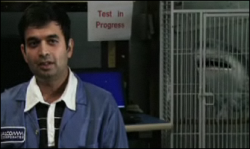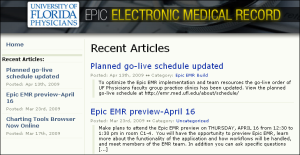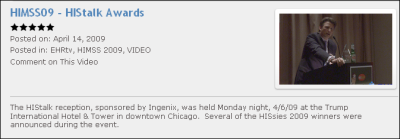Giving a patient medications in the ER, having them pop positive on a test, and then withholding further medications because…
News 4/15/09
 From HIPAA Hound: "Re: another example of poor privacy practices. Perhaps more disturbing than the loss of the patient data was that affected patients were not notified of the compromised information for a full 30 days." Link. A laptop belonging to Moses Cone Health System (NC) and containing information on 14,000 patients is stolen from a VHA office in Georgia, which was doing quality analysis of the hospital’s data. The hospital said it regrets waiting a month to let the affected patients, employees, and the public know. The laptop wasn’t encrypted, of course, and the hospital didn’t say why sending the VHA a laptop was the best way to get them data. If anyone can think of ways to screw up that the hospital missed, please let them know. And in a similar story, Southwest Mississippi Regional Medical Center finally comes clean to patients after a PC used by the billing company of its radiology group is stolen — in February.
From HIPAA Hound: "Re: another example of poor privacy practices. Perhaps more disturbing than the loss of the patient data was that affected patients were not notified of the compromised information for a full 30 days." Link. A laptop belonging to Moses Cone Health System (NC) and containing information on 14,000 patients is stolen from a VHA office in Georgia, which was doing quality analysis of the hospital’s data. The hospital said it regrets waiting a month to let the affected patients, employees, and the public know. The laptop wasn’t encrypted, of course, and the hospital didn’t say why sending the VHA a laptop was the best way to get them data. If anyone can think of ways to screw up that the hospital missed, please let them know. And in a similar story, Southwest Mississippi Regional Medical Center finally comes clean to patients after a PC used by the billing company of its radiology group is stolen — in February.
From Skip Stephenson: "Re: diagnosis code for a tree growing in your lung?" Link. Russian surgeons looking for a suspected lung tumor instead find a fir tree growing in the patient’s lung. Also from Skip: a surgery nurse at Dean Health (WI) is called out of the OR by her manager so she could be laid off. Now those are stories you won’t read elsewhere.
From The PACS Designer: "Re: native virtualization. As we hear more about the virtualization concept in daily media presentations, it appears that still more education is warranted since there are still doubts about its versatility. Sun Microsystems has just released a new open source software version for its VirtualBox. It will give experimenters the ability to apply ‘native virtualization’ to their installed systems using a desktop workstation" Link.
From Just the Beginning: "Re: Google Health. Blasted for data inaccuracy & raises questions about data exchange." Link. I don’t blame Google, at least not entirely. Hospitals are so terrible at capturing and exchanging complete, meaningful patient information that billing data is about as good as you can get (arguably better than nothing). Google’s mistake, if it made one, was either (a) not letting patients know that its information is suspect, or (b) trying to roll out a fully functional PHR knowing that it’s way too early to expect much in the way of available information except what the patient is willing to type in, so then dropping back to claims data to sex it up a little.
From Daryle Lamonica: "Re: eHealth Initiative. Interesting way to recruit a CEO. Saving executive search fees?" eHI e-mails out a notice of its job search, providing a direct link to its site to apply via its law firm.
From TrashTalker: "Re: the incestuous relationship between CIOs and their vendors. Sad but true. When is the healthcare industry going to wake up and kick these self-promoting, mostly non-tech CIOs out?" If you’re a Maslow’s Hierarchy of Needs fan, they are just attending to their basic and safety needs, thinking that buying the big-name products is not only safe, but also a better path to a future job should one be needed. And, buying same-vendor application clusters (all clinical apps, for example) from the same vendor provides that "one number to call" peace of mind even though it drives clinicians crazy to be overridden by a CIO looking out for #1. Every provider I’ve worked for, mostly big ones, encouraged clinician input into product selection, but then ignored it in buying more stuff from the same old underperforming vendor. The predictable result: low utilization ("you asked us what we wanted, we did the research, then you just ignored our recommendation and bought what you originally wanted").
From Hello Kitty: "Re: ACS. Rumor has it that while ACS Healthcare Solutions is announcing the Marin outsourcing deal, they are losing Southwest Washington and Princeton." Unverified.
From Cheezborger: "Re: ‘the power is in the network, not the desktop’. While I agree that there is power in simply getting data online now (e.g. access, potential for analytics, personalization, etc.) we can’t put the chicken before the egg. In other words, how do we think the data is going to get there in the first place? We often seem overly focused on the end effects of the EMR without giving enough respect to the concept of GIGO. If we can’t create an EMR that makes it easy to input and read data, then don’t expect too much from the output. While INTEROPERABILITY is a big buzz word due to this network effect concept, I’d strongly argue that the real key is USABILITY – we need systems that allow for easy interaction (better input of data, better display of data) before we need to worry about how they will share data. Said a simpler way, there is no payoff without use. What was so nice about Dale’s ‘story’ was the incorporation of both these facts — creating easier systems to engender utilization, then using the network effect to make the systems even easier and better to use!"
From Da Bear: "Re: Chicago. Chicago is the greatest convention city in the U.S. My company has also exhibited there annually at RSNA. But for crying out loud, can we settle on a month that is actually nice? RSNA is locked in the Daley Machine’s death grip and can’t move off their post-Thanksgiving date. HIMSS is under no such political obligation. Late May is usually wonderful."

From Bill Kinsella: "Re: Qualcomm video. Like the fake article Lyle sent you, the following Qualcomm (or is it??) video is worth a peek. I don’t know whether this was produced within Qualcomm or by a competitor." Link. "We came up with this idea to implant tiny base stations into thousands of pigeons and have them fly around and form a dynamic network." Pretty funny and very well done. Bill sent the YouTube link, but I found it directly on Qualcomm’s site, so they’re going all viral on us.
Now that we’re back into the usual post-HIMSS routine, we’ll get back to the interviews, HIT Moments, etc. If you know interesting people we should talk to, let me know.
Listening: new from Metric, indie/pop/new wave from Canada. Video here. Kind of a Throwing Muses meets the Pixies sound if you ask me. I like it very much.
University of Florida Physicians posts its Epic outpatient project Web page.
The authors don’t claim a high correlation, but this study suggests that states with strict privacy rules have a lower EMR adoption rate, but that the network effect means each hospital that implements electronic medical records increases the chances of others doing the same. I wouldn’t bet the farm on the privacy correlation since I can’t imagine hospitals sit around worrying about that, but certainly the lemming-like behavior of many hospitals makes the second conclusion reasonable.
New York City’s health department uses drug company marketing techniques, such as memorized pitches and free pens and condoms, to educate doctors on desirable practices.
Eric Fishman, MD (of EHR Scope, EMR Consultant, MCM-Medical Content Macros, and Dragon reseller) is the mastermind behind EHRtv, a wide-ranging series of professionally recorded interviews and tutorials by Dr. Eric himself. I’m enamored with the video quality, the layout, and the idea, especially since I saw him doing interviews for it at HIMSS. He captured some of the HIStalk reception and speeches, not easy since we had low light and iffy audio, and it’s a fun watch. He caught a nice speech there by Todd Cozzens of Picis.
Students from four big-name MBA schools participating in a "war game simulation" last week make interesting predictions: (1) EMR resistance will remain high, but P4P may help; (2) there won’t be enough HIT experts to implement all the EMRs being sold; (3) Allscripts and Epic will use cloud computing to drive down the cost of today’s client-server systems and make them affordable to small medical practices; (4) risky EMR implementations will push small medical practices to band together or merge; (5) Kaiser Permanente will take an active role in setting EMR-related best practices and standards; and (6) McKesson will use its logistics and value chain to increase its provider and payor IT offerings. I’ll say this: all sound reasonable, even when taking the dynamics of the organizations into account.
On HIStalk Practice, we’ve got a couple of docs sharing their thoughts about the HIMSS conference.
Excluding the university president and coaches, all of the 21 people at Ohio State University making more than $500K work for the medical center. The university claims that both the jocks and the docs are paid what the market demands even though the university’s own industry comparisons show it pays above its comparable peers in both categories. Isn’t that kind of admitting that nobody would want to work there if it wasn’t for the money? Seems like a trap hospitals everywhere have gotten into – paying more because they think they have to in order to get competent leaders (meaning: bribe them to leave somewhere else for a bigger paycheck just like when universities raid each other’s coaches). Once you’ve established yourself as a generous John, the best-looking hookers will always want more.
I’ve decided that since my day job title isn’t sufficiently lofty and I can hardly put HIStalk on my resume, I’m just going to start calling myself a thought leader and futurist. Those titles seem to be reserved for those willing to anoint themselves knowing that no approval is required, so I’m going to pad my resume. If anyone calls you to check, vouch for me.
ARRA is drawing companies into healthcare that have had zero interest previously, The Washington Post reports. Named: FreightDesk Technologies (cargo trackers turned Medicare auditors), RollStream (partner interactions), and the usual lame, just-started social networking startups (i.e., Web sites) masquerading as fervent healthcare consumer advocates.
Odd lawsuit: a woman dies a few hours after being sent home from a West Virginia hospital’s ED. Two years later, her husband gets an unsigned letter urging him to call an enclosed telephone number to find out what really happened to her. The ED doctor working that night calls back, saying nurses had killed his wife with an accidental overdose, that he had kept the original chart to prove it, and would testify on the family’s behalf. The doctor then allegedly changes his story, allegedly, telling the family there wasn’t really a medication error but he just wanted to get back at the hospital. In the mean time, the family found that the ED doctor had lost his privileges at another hospital, was not certified in emergency medicine, and had been the subject of review by both the hospital and the ED contract employer for poor care. The family is suing the hospital, the doctor, and the contract ED company.
HERtalk by Inga
From Fisher of Men: "Re: changes at Sage. I hear Sharon Howard from Sage is no longer there and they have hired a new VP of Sales." Unverified, though we did ask Sage and she’ no longer listed on the Sage Healthcare site. The leadership page says Jason Dvorak, formerly of TeraMedica, joined the company this month as senior VP of sales.
From Prairie Statesman: "Re: Illinois. Sure, the weather wasn’t perfect for HIMSS, but at least our governor wasn’t asking for Illinois to be declared a disaster area." Prairie Statesman sent this link with a copy of the Florida governor’s request for federal assistance following severe storms earlier this month. I responded (I think rather cleverly) that Illinois seems to be recovering from its own disaster area, right in the governor’s office.
HIMSS releases attendance numbers from last week’s conference and the numbers are down only slightly from 2008. An estimated 27,500 attendees traveled to Chicago, compared to the 29,100 participants at last year’s Orlando meeting. HIMSS attributes the drop numbers to general economic conditions and fewer personnel staffing exhibit booths. Based on conversations I have had with various health systems, I would also say many organizations sent a smaller contingent than in past years. Apparently the figures are based on registrations, so it’s quite possible a number of organizations ended up not sending everyone originally registered. Regardless, I’d say the numbers are respectable.
This is undoubtedly one of the gutsiest PR moves I’ve seen in awhile. SRS announces that Valley Oak Orthopaedics (CA) de-installed a CCHIT-certified EMR and replaced it with SRS hybrid EMR. The legacy EMR is not named, but the administrator is quoted as saying, "We chose the SRS hybrid after the existing traditional EMR in our practice drained our productivity and became unusable." Obviously it would be fun to know who is being replaced. Will the unnamed vendor speak up or ignore SRS?
A consumer survey concludes that 55% of us want the ability to talk to our docs via e-mail, 42% want to set up a PHR, and 57% want to schedule appointments and complete other transactions online. I think the e-mail and transaction figures look about right. On the other hand, I question whether 42% of Americans really want to set up AND maintain a PHR every time they go to a doctor, get a test result, or add a new prescription. Not too many people have the time or discipline to keep that up. Great idea whose time has not yet come.
Lehigh Valley Health Network plans to leverage the training resources from Greencastle Consulting to enhance its EMR implementations process for its ambulatory care practices. I believe Lehigh Valley is rolling out GE Centricity.
The India tourism ministry is finalizing a plan that would allow medical tourists to pay for one medical treatment and receive a second, smaller procedure for free. That sounds even better than Nordstrom’s annual shoe sale!
Congrats to Jodi Amendola, CEO of Amendola Communications, for her appointment to the board of directors of The X2 Healthcare Network. Jodi’s company is a healthcare and PR firm and X2HN is a not-for-profit organization of women healthcare executives representing more than 50 companies. I don’t know Jodi, but she clearly must be cool and has the PR thing figured out because she lists the HIStalk Fan Club as one of her important professional social networking organizations.
Perot confirms the elimination of 30 to 40 jobs at its Plano, TX headquarters.
Mark Anderson mentioned the term ICE on HIStalk Practice last month, which was the first time I had heard it. It seems to be catching on since I’ve now heard others use the term. ICE is an acronym for Integrated Community EHR (wow – an acronym that includes an acronym!) Essentially it’s a patient record produced from an IHE (integrated health network, yet another acronym.) BTW, all these acronyms make me LOL!
A federal judge sentences the former president of Roger Williams Medical Center (RI) to three years in prison for corruptly employing a former state senator to advance the medical center’s interest in the General Assembly. Supposedly Robert A. Urciuoli paid former Rhode Island state senator John Celona $260,000 in consulting fees in return for taking steps to support legislation favorable to Roger Williams and to kill bills deemed unfavorable. In October, Urciuoli was found guilty of 35 counts of mail fraud.
If you are a healthcare informatics specialist, you have one of the hottest jobs right now. According to the president and CEO of the American Medical Informatics Association, the recent passage of the ARRA legislation is creating a need for as many as 70,000 health informaticians.





ARRA is drawing companies into healthcare that have had zero interest previously…
Actually that’s not a bad idea, I spent over 25 years in sales and management with Fortune 500 companies in that business before I came to healthcare, and one thing I have to say, they take technology seriously and jump on it. when I came to healthcare I thought I had gone back in time a bit, and I’m speaking over 10 years ago here. Similar solutions with technology and data movement that I took for granted in the logistics business were missing in healthcare.
Many of my ideas were not re-creating the wheel, but rather modifying for some of the same processes for use in healthcare.
Re: The MBA school students and their “war game predictions”: Looks like a lot of very linear thinking. Is that what they foster in the “big-name MBA schools” these days? No wonder our banks, brokerage houses and so many other MBA-laden institutions are so ordinary…or even dysfunctional.
As an MBA from a non-big-name school (a demanding work-study program I wouldn’t trade), it would have been more heartening to see something bolder, more non-linear or insightful. These predictions are like betting the favorite at a horse race, or predicting “cold” in the winter, or that retail stores will sell more merchandise during the Christmas season than any other season.
True “war games” deal with outcomes, tactics and scenario planning (I’m also ex-military). And our healthcare system truly is at War. How about predictions such as what the adoption level of EMR will be in the next three years if CCHIT remains the “certification standard” going forward (given the failure rate is near 50% now)?
Or what the reasons for “EMR resistance” will continue to be, even with all the stimulus incentives on the table…and how that problem will/can be solved (surely it can’t just be funding)?
Or maybe even predict what it will take to eliminate the key root causes of EMR failure/adoption rate by producing Pareto Chart-type data of those root causes. Oh…those causes won’t be the same for all sizes of practices, surgical vs. non-surgical, in-patient vs. out patient, Orthopedic vs internal medicine, “fee-for-service based practice vs. salaried/hospital-based providers?
Every single article and submission on the stimulus bill seems to be driven from the “data” perspective….what functionality must a product have, how must it “share” data within the medical eco-system, it must report quality measures, etc. Before that data can be “reported” or “shared”, it must be gathered—that’s the role of the provider in the exam room. Where is the voice of busy, practicing physicians themselves—mysteriously under-represented on HITSP, the CCHIT committee, etc—to say “How do we make EMR more usable for practitioners?”, “How do we make it easy to implement and not force physicians to change the way they practice medicine” or “Show me the data that looks broadly at those who have implemented EMR systems and documents that the ROI is worth the time, money and losses I will encounter the first year?” The 80+% of physicians that haven’t adopted yet are still asking those questions…who’s going to answer them?
Landmark studies documenting EMR shortcomings are many; landmark studies documenting EMR benefits are non-existent. All EMR “success stories” seem to be selective by vendor, offering a small percentage of its clients. Why is that? Alternatives like Hybrid EMR are much more effective and successful. Why-?–usability.
Somebody needs to address these issues “pro forma”, not “ex post facto”…because here’s a prediction from a non big-school MBA: If we don’t, over the next 5 years, we’re going to waste billions or dollars in taxpayer money, generously available in the stimulus bill.
I can confirm the rumor that ACS is losing Princeton & Southwest Washington. They are also losing Mercy Memorial in Monroe, MI. Additionally, in the last year they have lost Port Huron & Lakeland – 2 other Michigan hospitals. Only Botsford remains in Michigan the home state of the former Superior Consultant.
re:consumer survey on PHRs. That’s not even taking into account the patients who don’t speak English or dont have internet connections at home, often the population who would most benefit from coordinated care.
Re: job title. Maybe you can work in a word like “evangelist”. Microsoft uses that for some of their senior developers. I giggle in considering “Thought Leader Evangelist” – you sure do seem to be trying to revive the process of having leaders actually think!
Much as I’d love to be in a hot job, I must note that informatics lust was declared by the Chair of AMIA.
We pay him to do that.
reefdiver – Agreed on the MBA students predictions. Let’s recap:
(1) EMR resistance will remain high, but P4P may help – Extra money for capital expenditures increases the ability to purchase IT equipment? Amazing. Reality is right now the P4P upside bonus potential just isn’t large enough to afford a top of the line “bells and whistles” EMR.
Even if the rate and size of P4P increases, it depends on what forms it takes. Still lots of debate about whether P4P targets should be a part of the annual fee schedule increase or a separate bump entirely. Early evidence that the the P4P upside have to be considerable (10% or more of their take home) and that physicians aren’t crazy about having half of their annual fee schedule bump suddenly tied to various quality targets.
(2) there won’t be enough HIT experts to implement all the EMRs being sold – Likely true to some degree but again the scope of the problem greatly depends on the adoption rate curve and what capacities you are talking about.
(3) Allscripts and Epic will use cloud computing to drive down the cost of today’s client-server systems and make them affordable to small medical practices – Frankly the most interesting prediction in the list although I would have been more interested to hear to what degree SaaS offerings will displace client-server systems and how quickly.
(4) risky EMR implementations will push small medical practices to band together or merge – Worst prediction among the list. This is already happening for several other factors due to market factors in most MSAs and has been for some time. What would have been interesting is a bit more insight into what specialties might be more effected by this than others and the physician organizations/contracting vehicles that might emerge as a result (group practice without walls, PHOs, IPAs, etc).
(5) Kaiser Permanente will take an active role in setting EMR-related best practices and standards – Sure to some degree but when are common laypeople going to realize that staff model HMOs like KP, Group Health, Geiseinger, Mayo, and others are the exception and not the norm in medical care. These organizations do not speak or are representative of a majority of the physicians and hospitals in the U.S.
(6) McKesson will use its logistics and value chain to increase its provider and payor IT offerings – Another big shrug. Only interesting thing with this prediction is if this means McKesson will create a host of organic new offerings/services and largely eschew acquiring companies as they have been doing the past several years.
diagnosis code for a tree growing in your lung?”-
It’s covered in the new ICD10 software …so better up grade now!
and:
3) Allscripts and Epic will use cloud computing to drive down the cost of today’s client-server systems and make them affordable to small medical practices
The MBA children are showing thier age! Cerner and Eclipsys have been doing this for years! Children, repeat after me: Cloud computing is Shared Services. Avante garde it is NOT!
“Students from four big-name MBA schools participating in a “war game simulation” last week make interesting predictions: (1) EMR resistance will remain high, but P4P may help;”
How about making EMRs easier to use? This includes personalization by physician or nurse, select versus enter, dictate complex orders in “human” terms; use voice recognition and personalization to present the order for review and approval.
Physicians and nurses are busy people. Make it easy and they will use it. Design it so they do more work and they will resist using it. But who wouldn’t respond the same way?